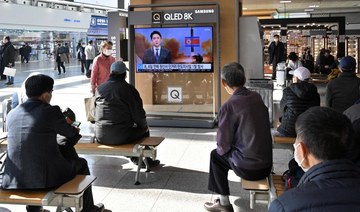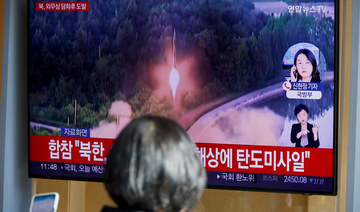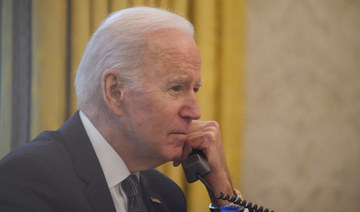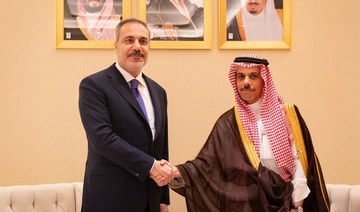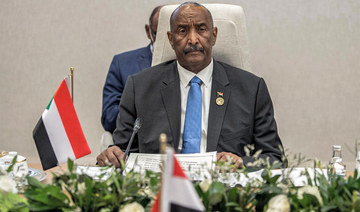SEOUL: North Korean leader Kim Jong Un said the test of a newly developed intercontinental ballistic missile confirmed that he has another “reliable and maximum-capacity” weapon to contain outside threats, as he warned the United States and its allies that their alleged provocative steps would lead to “their self-destruction,” state media reported Saturday.
North Korea’s state media said Kim oversaw the launch of the Hwasong-17 missile, a day after its neighbors said they had detected the launch of an ICBM that showed a potential ability to reach anywhere in the United States.
The North’s Korean Central News Agency said Kim observed the launch with his wife Ri Sol Ju and their “beloved daughter” as well as senior officials. State media photos showed Kim walking hand-in-hand with his daughter, who was clad in a white jacket and red shoes, together watching a huge missile loaded on a launch truck. It’s the first time for North Korea to publish the photo of Kim’s daughter. Observers say Kim observing a weapons launch with his family suggests that he was confident in its success.
Kim, 38, is the third generation of his family to rule North Korea. South Korean media reported he has three children born in 2010, 2013 and 2017 respectively. It wasn’t immediately known which child he took to the launch site.
Friday’s launch was part of the North’s ongoing barrage of missile tests that are seen as an attempt to expand its weapons arsenal and boost its leverage in future diplomacy. Some foreign experts said the Hwasong-17 missile is still under development but is the North’s longest-range ballistic weapon designed to carry multiple nuclear warheads to defeat US missile defense systems.
KCNA said the missile fired from the Pyongyang International Airport traveled up to a maximum altitude of about 6,040 kilometers (3,750 miles) and flew a distance of about 1,000 kilometers (620 miles) before it landed on the preset area in international waters off the country’s east coast.
“The test-fire clearly proved the reliability of the new major strategic weapon system to be representative of (North Korea’s) strategic forces and its powerful combat performance as the strongest strategic weapon in the world,” KCNA said.
Kim said his country is compelled to further bolster its “overwhelming nuclear deterrence” in the face of intensifying US military threats. Kim stressed the need to have the US and its allies realize that their military steps against North Korea would “lead to their self-destruction,” KCNA said.
“Kim Jong Un solemnly declared that if the enemies continue to pose threats to the DPRK, frequently introducing nuclear strike means, our party and government will resolutely react to nukes with nuclear weapons and to total confrontation with all-out confrontation,” KCNA said.
Kim’s statement suggests North Korea will continue its weapons testing activities as the United States is pushing to bolster its security commitment to its allies South Korea and Japan. There are concerns that North Korea could soon conduct its first nuclear test in five years.
The United Nations Security Council scheduled an emergency meeting for Monday morning on North Korea’s latest ballistic missile launch at Japan’s request. But it’s unclear if it can slap fresh sanctions on North Korea because China and Russia, two of the council’s veto-wielding members, opposed the United States and its allies’ moves to toughen sanctions on the North over its banned tests of ballistic missiles earlier this year.
US National Security Council spokesperson Adrienne Watson condemned Friday’s launch and said the United States will take “all necessary measures” to guarantee the safety of its territory and South Korea and Japan. Vice President Kamala Harris separately met with the leaders of those countries and of Australia, Canada and New Zealand who are attending a regional forum in Bangkok to discuss a joint response to North Korea.
South Korea and Japan also criticized the launch and held separate aerial drills with US forces. South Korea’s military said it also staged unilateral exercises simulating aerial strikes on North Korean mobile missile launchers.
Japanese Defense Minister Yasukazu Hamada said Friday that depending on the weight of a potential warhead, the missile had a range exceeding 15,000 kilometers (9,320 miles), “in which case it could cover the entire mainland United States.”
The North’s nuclear and missile arsenals are shrouded in secrecy. Some experts say North Korea is still years away from possessing a functioning nuclear missile, saying it has yet to prove technologies to ensure that warheads survive the harsh conditions of atmospheric reentry. But others say North Korea has likely already acquired such capacities given the number of years spent on its nuclear program.
In recent months, North Korea has performed dozens of shorter-range missile tests that it called simulations of nuclear attacks on South Korean and US targets. North Korea said its tests were aimed at issuing a warning to the United States and South Korea over their military training that the North views as an invasion rehearsal. Seoul and Washington have said their regular exercises are defensive in nature.
North Korea halted weapons launches for about a week before it fired a short-range ballistic missile on Thursday. Before that launch, North Korean Foreign Minister Choe Son Hui threatened to launch “fiercer” military responses to steps by the US to bolster its security commitment to South Korea and Japan.
US President Joe Biden met with his South Korean and Japanese counterparts Nov. 13 on the sidelines of a regional gathering in Cambodia, issuing a joint statement that strongly condemned North Korea’s recent missile tests and agreed to work together to strengthen deterrence. Biden reaffirmed the US commitment to defend South Korea and Japan with a full range of capabilities, including nuclear weapons.
Kim Jong Un: North Korea’s ICBM test proves capacity to contain US threats
https://arab.news/pmdbb
Kim Jong Un: North Korea’s ICBM test proves capacity to contain US threats
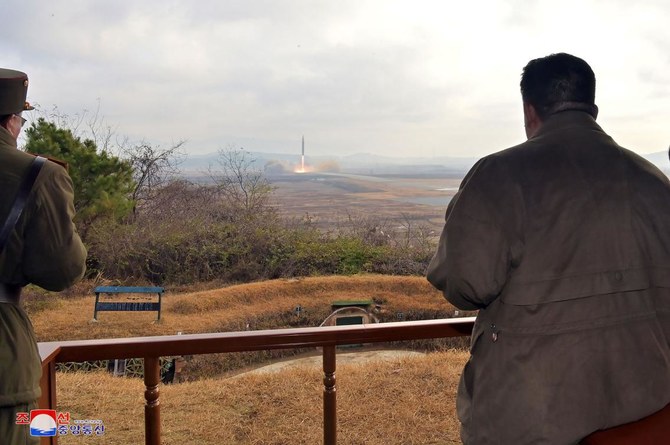
- North Korean leader oversees launch of the Hwasong-17 missile
- Kim Jong Un: Country compelled to further bolster its ‘overwhelming nuclear deterrence’
Columbia University begins suspending Israel-Hamas war protesters after ultimatum to disband camp
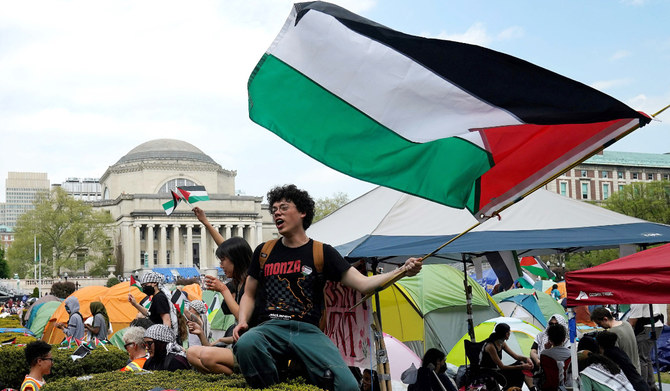
- At Columbia, student activists defied a 2 p.m. deadline to leave an encampment of around 120 tents on the school’s Manhattan campus
- Israel has killed more than 34,000 Palestinians in Gaza, mostly women and children, according to the health ministry in the Hamas-run territory
NEW YORK: Colleges around the US implored pro-Palestinian student protesters to clear out tent encampments with rising levels of urgency Monday as police arrested more demonstrators at the University of Texas and Columbia University said it was beginning to suspend students who defied an ultimatum to disband the encampment there.
Dozens of law enforcement officers, many in riot gear, confronted protesters who returned to the University of Texas at Austin on Monday. They quickly arrested six demonstrators and took others into custody one by one. Officers used pepper spray after a group of protesters blocked the path of a police van carrying demonstrators who were arrested. The crowd backed away but continued to block the exit from campus. Officers then used two flash bang explosives to clear a path so the van could leave.
Republican Gov. Greg Abbott reposted on social media video of troopers arriving on the 50,000-student campus. “No encampments will be allowed,” Abbott said. Just last week, hundreds of police pushed into protesters at the university, arresting 34 people.
At Columbia, student activists defied a 2 p.m. deadline to leave an encampment of around 120 tents on the school’s Manhattan campus. Instead, hundreds of protesters marched around the quad, clapping, chanting and weaving around piles of temporary flooring and green carpeting meant for graduation ceremonies that are supposed to begin next week.
A handful of counter-demonstrators waved Israeli flags, and one held a sign reading, “Where are the anti-Hamas chants?”
The university didn’t call police to roust the demonstrators. But three hours after the deadline passed, school spokesperson Ben Chang said Columbia had begun suspending students. He didn’t indicate how many students were involved. He also didn’t say how the suspensions would be carried out or whether suspended students would be ejected from the campus.
Chang said that while the university appreciated the free speech rights of students, the encampment was a “noisy distraction” that was interfering with teaching and preparation for for final exams. The protests also made some Jewish students deeply uncomfortable, he said.
Protest organizers said they were not aware of any suspensions as of Monday evening.
The notice sent to protesters earlier Monday said if they left by the deadline and signed a form committing to abide by university policies through June 2025, they could finish the semester in good standing. If not, the letter said, they would be suspended, pending further investigation.
Early protests at Columbia sparked similar pro-Palestinian protest encampments at schools across the US Students and others have been sparring over the Israel-Hamas war and its mounting death toll. Many students are demanding their universities cut financial ties with Israel. The number of arrests at campuses nationwide is approaching 1,000. The protests have even spread to Europe, with French police removing dozens of students from the Sorbonne university after pro-Palestinian protesters occupied the main courtyard.
College classes are wrapping up for the semester, and campuses are preparing for graduation ceremonies, giving schools an extra incentive to clear encampments. The University of Southern California canceled its main graduation ceremony.
But students dug in their heels at some high-profile universities, with standoffs also continuing at Harvard, the University of Pennsylvania, Yale and others.
Protesters at Yale set up a new camp with dozens of tents Sunday, nearly a week after police arrested nearly 50 and cleared a similar one nearby. They were notified by a Yale official that they could face discipline, including suspension, and possible arrest if they continued.
Yale said in a statement Monday that while it supports peaceful protests and freedom of speech, it does not tolerate policy violations such as the encampment. School officials said that the protest is near residential colleges where many students are studying for final exams, and that permission must be granted for groups to hold events and put up structures on campus.
In a rare case, Northwestern University said it reached an agreement with students and faculty who represent the majority of protesters on its campus near Chicago. It allows peaceful demonstrations through the June 1 end of spring classes, requires removal of all tents except one for aid, and restricts the demonstration area to allow only students, faculty and staff unless the university approves otherwise.
At Brown University in Rhode Island, school President Christina H. Paxton offered protest leaders the chance to meet with officials to discuss their arguments for divestment from Israel-linked companies in exchange for ending an encampment.
In the letter to student protesters at Columbia, school officials noted that exams are beginning and graduation is upcoming.
“We urge you to remove the encampment so that we do not deprive your fellow students, their families and friends of this momentous occasion,” the letter said.
The demonstrations have led Columbia to hold remote classes. The school said in an email to students that bringing back police “at this time” would be counterproductive. The university said it will offer an alternative venue for the protests after exams and graduation.
Columbia’s handling of the protests has prompted federal complaints.
A class-action lawsuit on behalf of Jewish students alleges a breach of contract by Columbia, claiming the university failed to maintain a safe learning environment, despite policies and promises. It also challenges the move away from in-person classes and seeks quick court action requiring Columbia to provide security for the students.
Meanwhile, a legal group representing pro-Palestinian students is urging the US Department of Education’s civil rights office to investigate Columbia’s compliance with the Civil Rights Act of 1964 for how they have been treated.
A university spokesperson declined to comment on the complaints.
The plight of students who have been arrested has become a central part of protests, with the students and a growing number of faculty demanding amnesty for protesters. At issue is whether the suspensions and legal records will follow students through their adult lives.
Demonstrators on other campuses, meanwhile, said they would stand firm. Jacob Ginn, a second-year University of North Carolina sociology graduate student, said he had been protesting at the encampment for four days, including negotiations with administrators Friday.
“We are prepared for everything and we will remain here until the university meets our demands and we will remain steadfast and strong in the face of any brutality and repression that they try to attack us with,” Ginn said in reference to a potential police sweep of the encampment.
US President holds separate calls with leaders from Qatar, Egypt over Gaza ceasefire talks

- The danger of a military escalation in Rafah was also stressed, in how it would add catastrophe to an already worsening humanitarian crisis that would impact stability and security in the region, the statement said
CAIRO: Egyptian President Abdel Fattah El-Sisi received a phone call on Monday from US President Joe Biden to discuss the latest developments in negotiations over a ceasefire in Gaza and the dangers of a military escalation in Rafah, a statement from Egypt’s presidency said.
The spokesman for the Egyptian Presidency said the call also touched on the exchange of Israeli hostages for Palestinian prisoners, a main sticking point in any comprehensive ceasefire deal between Hamas and Israel.
A Hamas delegation is currently in Cairo to deliberate on Israel’s response to a ceasefire deal.
The danger of a military escalation in Rafah was also stressed, in how it would add catastrophe to an already worsening humanitarian crisis that would impact stability and security in the region, the statement said.
“President El-Sisi stressed the necessity of full and adequate access to humanitarian aid, reviewing the intensive Egyptian efforts in this regard.
The two presidents also stressed the necessity of working to prevent the expansion of the conflict and reaffirmed the importance of the two-state solution as the means to achieve security, peace, and stability in the region,” the Egyptian presidency statement said.
Biden also held a phone call late on Monday with Qatar’s Emir Sheikh Tamim bin Hamad Al Thani, whose country has also played a role as mediator to the conflict.
“During the call, they discussed developments in the situation in the Gaza Strip and the occupied Palestinian territories, and efforts of the two countries to reach an immediate and permanent ceasefire agreement in Gaza,” Qatar’s Emiri Diwan said in a statement.
India protests separatist slogans allowed at Toronto event
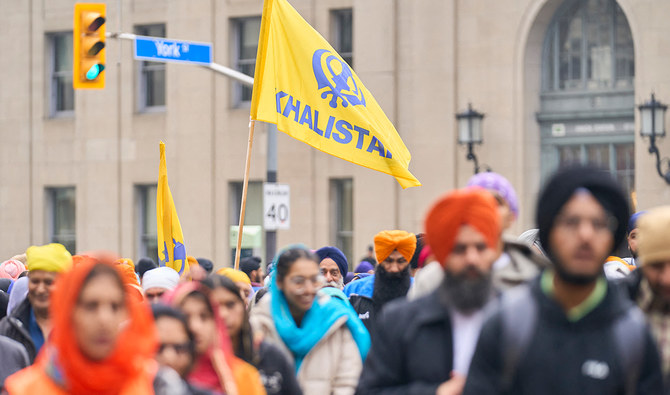
- Bilateral relations soured last year after Canada linked Indian agents to June 2023 murder of its national
- Hardeep Singh Nijjar, 45, was shot dead outside a Sikh temple in Surrey, which has a large Sikh population
NEW DELHI: India summoned the Canadian Deputy High Commissioner on Monday and expressed “deep concern and strong protest” after separatist slogans in support of a Sikh homeland were raised at an event addressed by Prime Minister Justin Trudeau.
Bilateral diplomatic relations soured last year after Trudeau said Canada was “actively pursuing credible allegations” that Indian agents were potentially linked to the June 2023 murder of a Canadian citizen.
Hardeep Singh Nijjar, 45, was shot dead outside a Sikh temple on June 18 in Surrey, a Vancouver suburb with a large Sikh population. Nijjar supported a Sikh homeland in the form of an independent Khalistani state and was designated by India as a “terrorist” in July 2020.
New Delhi has denied any formal government role in Nijjar’s murder.
India’s foreign affairs ministry said on Monday it had conveyed “deep concern and strong protest” at such actions “being allowed to continue unchecked at the event.”
Slogans supporting the rise of a separatist state were raised at an event in Toronto, according to ANI news agency, in which Reuters has a minority stake.
“We will always be there to protect your rights and your freedoms, and we will always defend your community against hatred and discrimination,” ANI reported Trudeau as saying.
Canada has the highest population of Sikhs outside their home state of Punjab in India, and the country has been the scene of many demonstrations that have irked India.
The Canadian foreign ministry did not immediately respond to a request for comment.
UN asks South Sudan to remove new taxes that led to a pause in food airdrops
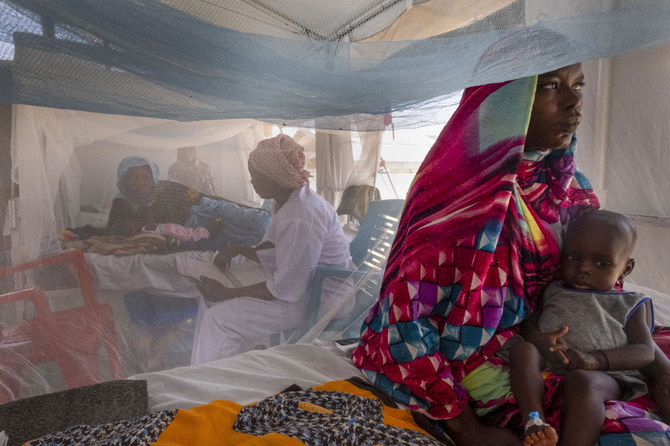
- UN said that pausing of airdrops in March had deprived of food 60,000 people who live in areas that are inaccessible by road
JUBA: The United Nations has urged South Sudan to remove newly imposed taxes and charges that led to the suspension of UN food airdrops for thousands of people who depend on outside aid.
The UN Humanitarian Affairs Agency said Monday in a statement that the pausing of airdrops in March had deprived of food 60,000 people who live in areas that are inaccessible by road, and their number is expected to rise to 135,000 by the end of May.
The UN said the new charges would have increased operational costs to $339,000 monthly, which it says is enough to feed over 16,300 people. The new charges introduced in February are related to electronic cargo tracking, security escort fees and new taxes on fuel.
“Our limited funds are spent on saving lives and not bureaucratic impediments,” Anita Kiki Gbeho, the UN humanitarian coordinator for South Sudan, said.
UN spokesman Stéphane Dujarric said in New York that the taxes and charges are also impacting the nearly 20,000-strong UN peacekeeping mission in South Sudan, “which is reviewing all of its activities, including patrols, the construction of police stations, schools and health care centers, as well as educational support.”
The UN says the South Sudan government had said it would remove the new charges and taxes but had not committed to it in writing since February.
An estimated 9 million people out of 12.5 million people in South Sudan need protection and humanitarian assistance, according to the UN The country has also seen an increase in the number of people fleeing the war in neighboring Sudan, further complicating humanitarian assistance to those affected by the internal conflict.
French police remove pro-Palestinian students from the courtyard of Sorbonne university in Paris
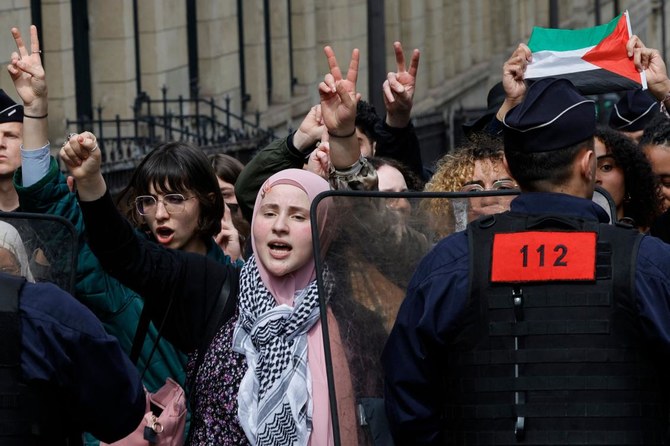
- About 50 protesters set up tents at midday Monday at the elite university’s courtyard
PARIS: French police removed dozens of students from the Sorbonne university after pro-Palestinian protesters occupied the main courtyard of the elite institution in Paris on Monday.
About 50 protesters set up tents at midday Monday at the Sorbonne university courtyard in support of Palestinians, echoing similar encampments and solidarity demonstrations across the United States.
Protesters unveiled a giant Palestinian flag and chanted slogans in support of Palestinians in Gaza, as Israel continues its offensive following the deadly Oct. 7 Hamas attack that triggered the Israeli-Hamas war. Police entered the university grounds in the early afternoon and removed them.
About 100 demonstrators took part in the protest near the prestigious university amid heavy police presence that were also guarding the university entrance to prevent students from setting up camp inside again.
Lorelia Frejo, a graduate student at the Sorbonne who joined a protest outside the university, said police used force to remove her peers from the courtyard. “They were peaceful and police took them out with no explanation,” Frejo said. Students in Paris were inspired by the protests at New York’s Columbia University who remain steadfast despite police pressure, she added.
“They (Columbia protesters) are very strong and want to fight for justice and for peace in Palestine,” Frejo said.
The Sorbonne occupies a unique place at the heart of French public and intellectual life. Last week, President Emmanuel Macron chose it as the venue to deliver a speech on his vision of Europe ahead of elections for the European Parliament in June.
Last week protests broke out at another elite university in the French capital region, the Paris Institute of Political Studies, known as Sciences Po, which counts Macron and Prime Minister Gabriel Attal among its many famous alumni.
Tensions had broken out on campus as pro-Palestinian students inspired by Gaza solidarity encampments at campuses in the United States sought to occupy an amphitheater.
On Friday, pro-Palestinian and pro-Israeli demonstrators faced each other in a tense standoff in the street outside the school. Riot police stepped in to separate the opposing groups.
The protest ended peacefully, when students agreed to evacuate the building late on Friday. The head of Sciences Po said an agreement with students had been reached.



